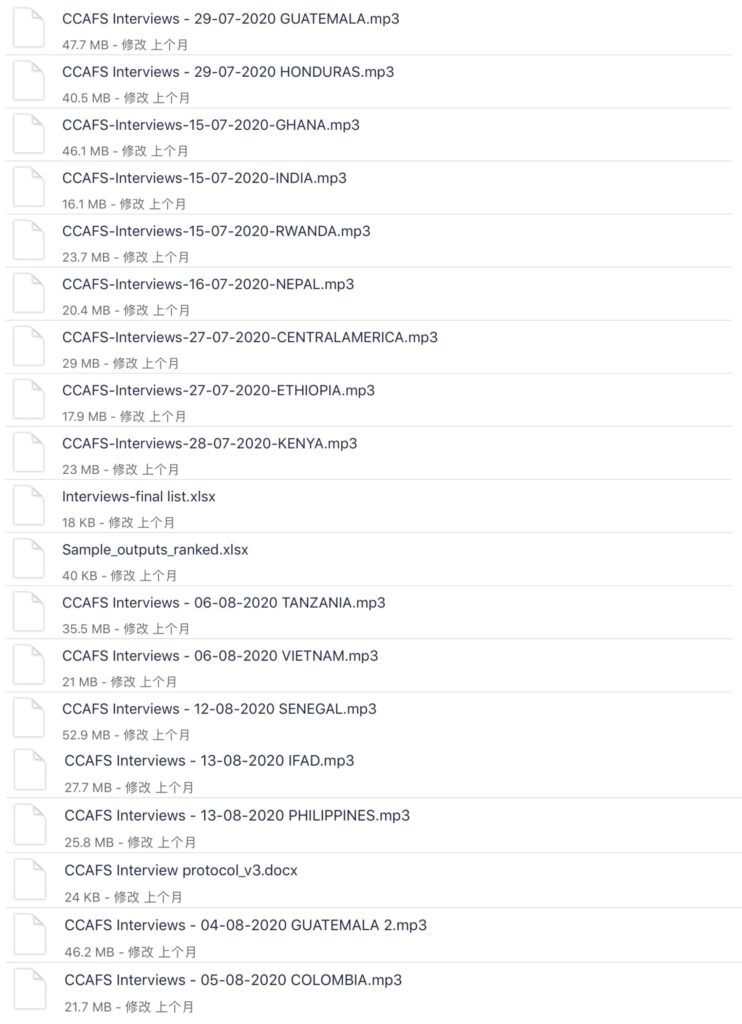We conducted a total of 16 remote interviews with members of government organizations, between July 15 and August 10. These interviewers have experience in participating in CCAFS projects, and shared their valuable experiences and ideas with us during the interview. Our interviews generally start with open questions, and let the interviewee give a brief introduction to his position and his experience in participating in the CCAFS project. For example, the interviewee from Ghana said that although he has retired from the department, he is retiring. He has many years of working experience with CCAFS. After the interviewee has answered the questions in the “Introduction” section, we will ask questions in the following four areas.
Awareness
When we asked whether CCAFS projects helped increase your organization’s awareness of climate-smart agriculture (CSA). All interviewees gave positive answers. The high-frequency words that appeared in the answers mainly included Climate Change; GHG emission; mitigation; many interviewees mentioned that CCAFS helped them realize that CSA can reduce climate change. The impact of the coming has improved the resilience to climate change. Respondents from Vietnam said that CSA helped them reduce GHG emissions while increasing farmers’ income. It is worth mentioning that some interviewees mentioned in this section that CCAFS provides them with the opportunity to visit CSA progress in other countries. The interviewee from India stated that he and his colleagues had been to workshops in Sri Lanka and Kenya, where people from different countries shared their experiences and progress on CSA; interviewees from Honduras said that climate perspective were a fresh experience for them. They decided to implement it in their country after visiting Colombia and saw the experience.
Stakeholder influence
When asked whether stakeholders at all levels are involved in CCAFS projects, most of the interviewees answered this question from different angles, which probably means that stakeholders at different levels have received different help.
Respondents from Nepal said that through CCAFS projects, their employees from government agencies have received a lot of courses and training; and the policy level will receive policy guidelines to help them shape a more favourable agricultural environment. The interviewer from Senegal specifically mentioned that the CCAFS project has empowered farmers and they are very proud of having people from different countries come to visit and learn about it. Respondents in Vietnam also stated that their researchers have learned new equipment through the CCAFS project. Here, the interviewees give examples that researchers and farmers have learned to choose the best rice varieties to help increase yields. Through these new technologies and information assistance provided by CCAFS, the policy can be established. Interviewee from Tanzania stated that they selected some areas as experimental areas for the implementation of climate-smart agriculture first, and then used these areas as examples of all districts. It is worth mentioning here that respondents from many countries (such as Vietnam, India, etc.) said that due to limited resources, farmers who may be supported are also very limited. They hope that more resources can be used to directly help farmers.
Knowledge
It must be worth mentioning that because the CCAFS project is not a single goal, their results are displayed in all aspects at the same time. In the answers to the first two questions, many interviewees have mentioned the experience of acquiring knowledge and learning new technologies. The answer to this question is also very positive. Interviewees from many countries have expressed that they have gone to other countries to exchange, study or receive training.
Respondents from India stated that they first participated in a project to improve CCAFS-related knowledge in 2011. They not only learned new technologies, but also went to Australia for training courses. He also said that some of their researchers participated in a workshop held in Indonesia, where they exchanged their experiences and learned a lot of experience and new knowledge. Respondents in Colombia stated that although they used to talk about climate change and gender issues, they learned how to reduce vulnerability after participating in the CCAFS project. Respondents in Vietnam believed that knowledge was not only learned by researchers, but also by farmers. For example, interviewees from Ghana said that they had a group of farmers who went to Burkina Faso to visit a project, which was also an improvement in knowledge. The interviewee from Philippines believes that it would be most effective for the public to obtain knowledge from copies because of the limited access to the knowledge uploaded in the internet. For example, they had a guide book published by Department of Agriculture which circulated in every region.
Policy influence
In the interview, many interviewees cited specific policies contributed by the CCAFS project. For example, Vietnam’s food plan and CSA plan, Nepal’s CSA policy, Tanzania’s agricultural climate resilience plan, CSA plan and guidelines, and Ghana has implemented policies on climate change and implemented CSA plans and other countries’ policies. Respondents in India also stated that they are advancing the process of policy implementation. Interviewees in Tanzania believe that more should be done to influence policy makers, because this is the most easily heard group. Once policymakers acknowledge the results and publish policies, they can influence more groups. Interviewee from Colombia also raised the concern that governments are not able to go in-depth. But Ghana’s experience is worth mentioning. The interviewees said that since Ghana was selected to implement the CCAFS plan in 2010, CCAFS helped them build a platform. This platform connects Farmers and policy makers. The role of this platform is mainly to improve policy issues and implement plans among farmers. In this way, not only the voices of policy makers can be heard, but farmers are also empowered.

Stakeholder Interview Protocol
Objectives:
1. To validate and to complement the digital research through the stakeholders’ involvement in the CCAFS and what influence the programme has had at the institutional/local/beneficiary levels
2. To uncover the effectiveness of CCAFS capacity development efforts
Method:
– Semi structured interviews to collect “stories” and narratives based on stakeholders own experience/role/vision of programme.
Questions:
1. Intro:
1.1 Describe your role within your organization and your involvement with CCAFS
1.2 How and why did your organization become a partner in the programme?
1.3 Describe your organization’s involvement in the programme
2. Stakeholder involvement/influence:
2.1 Has your organization increased/improved awareness of CSA? If so, can you describe some concrete examples?
2.2 Considering the CCAFS projects you are involved in, do you think CCAFS has influenced the various stakeholders to tackle climate change and/or to embrace CSA? If so, which stakeholders has it influenced and how?
2.3 As CCAFS has produced a wealth of knowledge over the life of the programme, do you think this knowledge reaches the right people? How do you think stakeholders engage with it?
2.4 Can you recall specific situations/examples in which CCAFS has influenced your organisation? (ex. to establish policy, to build capacity, to adopt new technologies)
2.5 Specifically regarding policy, what policies has your government implemented because of CCAFS activity in your country?
3. Capacity development:
3.1 Has your organisation benefitted from CCAFS’ capacity development strategy? If so, can you describe any specific efforts that you took part in? How was capacity enhanced through these?
3.2 Based on your experience, what is your overall assessment of CCAF’ capacity development efforts? How effective is it? What is positive and what can be improved?
